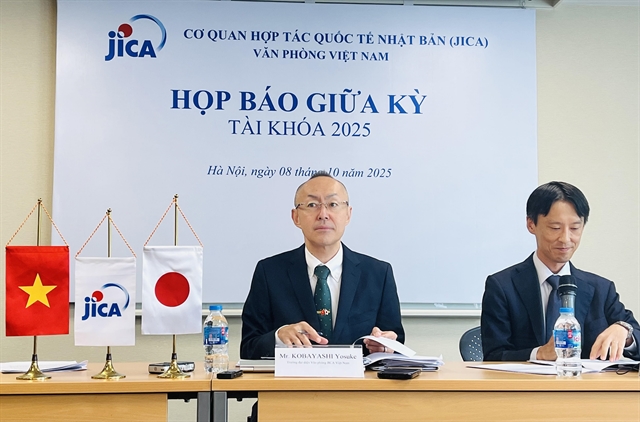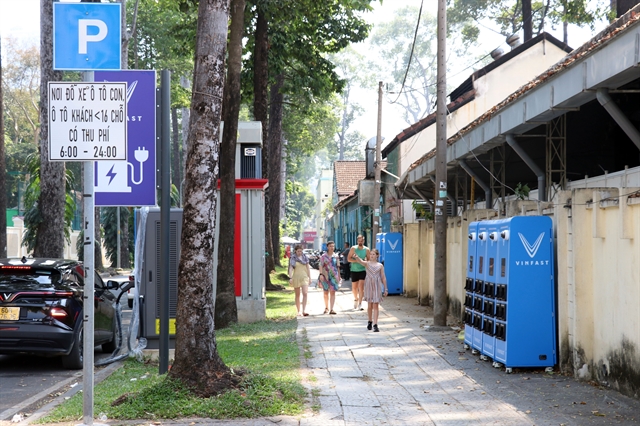 Society
Society


|
| Yên Xá Wastewater Treatment Plant in Hà Nội.— VNA/VNS Photo Thành Phương |
HÀ NỘI — The Japan International Cooperation Agency (JICA) will focus on human resource development in the second half of the fiscal year 2025, strengthening its Official Development Assistance framework with Việt Nam and aligning closely with the country’s four key reform pillars.
These pillars aim to promote science, technology, innovation and digital transformation; advance international integration; improve law-making and enforcement; and foster private sector growth.
The priorities were unveiled at JICA Việt Nam’s mid-fiscal year press conference on Wednesday in Hà Nội.
Chief Representative of JICA Việt Nam Kobayashi Yosuke highlighted ongoing collaboration with the Việt Nam-Japan University, a symbol of the enduring friendship between the two nations.
In partnership with Professor Usagawa, former Vice President of Kumamoto University, JICA is supporting the university in launching a bachelor’s degree programme in semiconductor engineering, which began in September. The agency will continue to strengthen Việt Nam’s semiconductor training ecosystem by linking stakeholders across both countries.
Artificial intelligence (AI) is another key focus. JICA is promoting AI development through partnerships with the National Innovation Centre and Hà Nội University of Science and Technology, supporting start-ups and research initiatives.
On international integration, JICA is backing major infrastructure projects, including urban rail systems and customs modernisation initiatives.
For law-making and enforcement, the agency is assessing ways to highlight the impact of its long-term legal and judicial reform projects while continuing leadership training programmes aligned with Việt Nam’s two-tier local government model.
In the private sector, JICA encourages the growth of small- and medium-sized enterprises, especially women-led businesses, through entrepreneurial training and improved access to finance.
“These efforts underscore JICA’s commitment to accompanying Việt Nam on its journey towards becoming a high-income nation by 2045 through inclusive and sustainable development,” Kobayashi said.
He added that these priorities reflect JICA’s broader cooperation framework, designed to support the advancement of Việt Nam’s four reform pillars. He also emphasised that the enduring 'bond of the heart' between the Vietnamese and Japanese people forms the foundation of JICA’s projects, with its experts and volunteers at the forefront of nurturing this relationship.

|
| Kobayashi Yosuke, Chief Representative of JICA Việt Nam Office at the press conference on Wednesday in Hà Nội.— VNS Photo Nguyễn Hằng |
Responding to climate change
Applying science, technology and innovation to tackle climate change is also regarded as a priority, he said.
Building on its long-standing partnerships with leading Vietnamese universities such as Cần Thơ University, JICA will continue to cooperate with universities, enterprises and research institutes from Japan to support Việt Nam in developing and applying new technologies.
Answering questions from the media at the press conference, Kobayashi said that to help Việt Nam address climate change, pollution and the energy transition, JICA is combining short-term interventions with long-term cooperation.
To mitigate the impacts of natural disasters such as landslides, JICA has introduced SABO dam technology for controlling flash floods and supported the construction of Việt Nam’s first SABO dam in the northern mountainous province of Sơn La.
To reduce urban flooding and pollution, JICA has assisted with the Yên Xá Wastewater Treatment Plant Project, currently one of the largest of its kind in Southeast Asia.
In the coming period, JICA is preparing ODA loan projects aimed at improving infrastructure in vulnerable northern mountainous provinces while also supporting the implementation of climate response policies.
“These efforts reflect JICA’s commitment to supporting Việt Nam in addressing environmental challenges through both emergency measures and long-term capacity building,” he said.
Ongoing projects
Also at the press conference, he named ongoing JICA projects from October 2024 to September 2025.
Regarding financial and investment cooperation, there are 15 ongoing ODA Loan Projects and five new projects belonging to the private sector investment finance programme.
For technical cooperation, 33 projects are being implemented with a total budget of JPY4.8 billion (approximately US$32.4 million).
In terms of grant aid, there are five ongoing projects with a total committed capital of JPY2.55 billion (approximately US$17.2 million).
Meanwhile, there are 28 ongoing projects, including nine new ones, under various programmes proposed by Japanese private enterprises,
Regarding the development partnership programme, there are 18 ongoing projects, including three new ones.
For Japan Overseas Cooperation Volunteers, there are 42 volunteers currently active, including 24 newly dispatched members. — VNS




